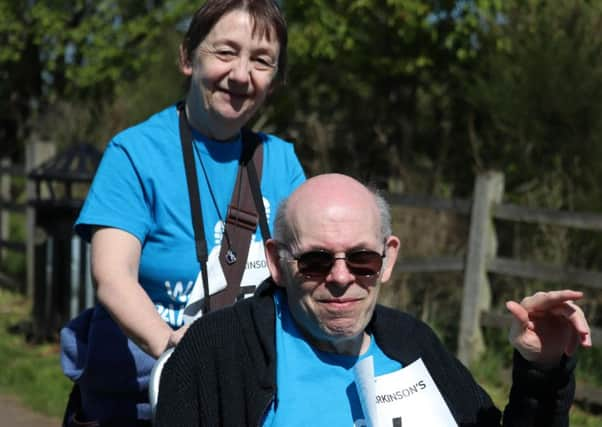The victim of a care postcode lottery


Now the near-baffling case of his family’s attempts to seek help for 65 years-old Martin Purchase has been used by a national charity to publicise what it calls a “Postcode Lottery” of care provision for those stricken by the illness.
The charity has hit out at the fact that local councils decide what to charge disabled people for the extra support they need to stay well and live independently.
Advertisement
Hide AdAdvertisement
Hide AdA spokesperson for Parkinson’s UK Scotland said: “While personal care is free, any support that falls outside the tight legal definition of ‘personal’ can be charged for. Despite national guidelines, different rates are levied in different areas across Scotland.”
The charity says that the cost of home-care packages means that some go without the support they need, while others are facing huge bills for their care, with some unable to work out how their charges are calculated.
Martin Purchase has been living with Parkinson’s for 24 years. In 2015, after 20 years of supporting Martin themselves, the family asked South Lanarkshire Council if any help could be made available to lessen their workload.
Martin was assessed as being entitled to support while Fiona was at work. The following year, Fiona’s father died and left her a small inheritance.
Advertisement
Hide AdAdvertisement
Hide AdThe council changed its charging policies, and early in 2017 Martin was told that instead of receiving a grant he would now have to pay £128.77 per week towards his care.
After an arduous appeal process, the amount was eventually reduced to a more manageable £23.17 per week.
In 2019, Martin turned 65 and the council re-assessed Marti’s care charges again. Astonishingly, the weekly bill for the identical package more than tripled to £82.75. Again, after an appeal the amount payable by Martin was reduced - this time to £65.95 per week.
Fiona turns 60 this year, and is considering retirement. But South Lanarkshire’s policy on charging means that Fiona is concerned that her pension and the lump sum she’s due to receive on retirement will, like her modest inheritance, be targeted by the council to pay for Martin’s care.
Advertisement
Hide AdAdvertisement
Hide AdFiona works for a neighbouring local authority, which does not charge for care in this way, and self-directed support packages like Martin’s are not subject to charging. Fiona says: “I’m afraid to retire. My pension lump sum - money invested to support me in my older age - will be gobbled up by South Lanarkshire’s charges. Yet if I lived 3 miles up the road in the authority where I work, there would be no charges whatsoever. This just seems incredibly unfair.”
Annie Macleod, Director of Parkinson’s UK Scotland, said: “The system being used today essentially creates varying rates of local taxes on disability. Some councils choose not to charge, but most do. It is fundamentally unjust, and extremely stressful for families who are seeing their safety nets appropriated by councils to pay for essential care. In the upcoming budget, the Scottish Government should intervene now and expedite a national policy of free non-residential social care, as the First Minister promised last year. The sums of money currently charged can be life-changing, and household budgets are severely impacted by the different policies being implemented across Scotland. The system also punishes people like Martin and Fiona for staying together as a couple. If they were apart then Fiona’s liabilities would end.
“The number of people living with Parkinson’s will increase by about a fifth in the next decade, which means we expect more and more people to be penalised by care charges simply because of where they live. This is unacceptable, and Parkinson’s UK Scotland calls on the Scottish Government to work with local authorities to scrap charges now. People like Fiona and Martin simply can’t wait until after the next Scottish parliamentary election.”
A spokesperson for South Lanarkshire Health and Social Care Partnership, said: “We are aware of this case, and while we would not disclose information in relation to Mr Purchase’s needs, we are confident that they have been fully assessed and the appropriate support has been given. This has also been looked at by the Ombudsman and agreed in favour of the council.”
For advice, information and support, visit www.parkinsons.org.uk or call our free, confidential helpline on 0808 800 0303